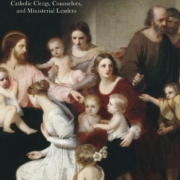Communion in Quarantine by Dr. Andrew Sodergren
Masks. Social distancing. Cancelling events. Virtual meetings. Dispensations from Mass. Quarantining. These are some of the isolating, unprecedented hallmarks of 2020. Those in authority justify these measures as short-term strategies to slow the spread of COVID-19. Whatever their short-term benefit, many people are understandably concerned about the long-term impact of these drastic actions on individuals, families, and society as a whole. Man — as we know from Theology of the Body — is not made for isolation but for communion. How then, are we to navigate a time when something so fundamental to our very being is challenged on every side?
Back to Basics
One of the key concepts that Pope St. John Paul II returned to again and again in his various writings, especially Theology of the Body, was communio personarum – communion of persons. While
this term can analogously be applied to marriage and family, the Church, communities and societies, the prototype of communio is the Blessed Trinity. In God, we see that the Source of our very being and the End to which we are called is nothing less than an eternal Communion of Persons. God is not a static, isolated being but for all eternity is a Personal Exchange of Love. In the Trinity, revealed to us by Christ, we see maximum distinction (each divine Person is fully distinct from the Others) and maximum unity (the Divine Being is in no way fractured or divided such that we can fully affirm One God). In the One Divine Being, Father, Son and Holy Spirit give and receive one another in an eternal exchange of love, which John Paul II termed communio.
In reflecting on the nature of man who is made in God’s image and likeness, John Paul II further saw communio as essential to understanding our identity and our calling. In the Second Vatican Council’s document Gaudium et spes, which JP2 helped to write, we read:
John Paul frequently referred to this passage, citing it in all his major documents as pope and in his Theology of the Body. The bottom line is this: man is made for communio. We cannot understand what it means to be human — nor what is healthy for humans – apart from this.
The Hell of Isolation
As we have seen, God is a Communion of Persons, and man, being made in His image, is called to reflect that Communio on Earth and participate intimately in it in Eternity. It follows, then, that Hell is utter isolation, being definitively cut off from the Divine Communio. Indeed, if we were made to participate in the Divine Exchange of Love, what could be more painful than to be utterly isolated, cut off from God and others forever?
Indeed, we see glimpses of this even in this life. Psychologists have known for decades that isolation is inherently threatening and damaging to human beings. It goes against our fundamentally social nature. This is especially true for children who come into the world with an innate drive to form lasting emotional bonds with their parents and others. Their healthy development hinges on growing up in an environment rich with socioemotional cues that they are known, loved, valued, and cared for. Much has been written in theology and psychology about the essential role of the parents’ smile in communicating a sense of delight that forms the basis of a child’s self-worth.
This drive to form and maintain emotional bonds remains with us throughout our life and is a basic hallmark of human nature: we are made for connection! When we are cut off from others at any stage of life, our bodies and our minds are more prone to illness and early death. Indeed, social rejection has been found to stimulate the same pain pathways in the brain as physical injury as well as increase the risk for a host of mental and physical illnesses. Experimental studies have even shown that such rejection negatively impacts our cardiac and immune functioning.
Cultivating Communio
In order for us to survive these difficult times, we need to work together to build a culture of communio. How can we do this? First, we have to recognize that relationships are always risky. During this time of pandemic, people have a heightened awareness of the physical risks of being together. However, we have to realize that any time we reveal ourselves to another and make space for another in our hearts, we accept the possibility of hurt, rejection, betrayal, as well as the inevitability of loss. We can either allow fear of these experiences to drive us toward isolation, or we can draw strength from our Lord and follow the example of Him who made himself vulnerable out of love in order to give new life to us.
We must seize any opportunities we have for true connection. When in-person togetherness is blocked, we do well to avail ourselves of the various virtual tools at our disposal to communicate with others, especially those who are most isolated right now. However, virtual connection can never replace the value of incarnate presence. Just as Jesus gave us His True Body and Blood as His Real Presence among us, we too need to eagerly look for opportunities for incarnate presence with others.
When we are able to be with others but suffer the obstruction of facial coverings, we can concentrate on the other person’s eyes. The eyes have long been regarded as the window to the soul, and psychologists have shown how it is possible to decode the emotional state of another person with remarkable accuracy simply by observing the expression of the eyes. Look at the eyes of the people around you and try to guess what they are feeling. Allow yourself to feel with them, resonating with their emotional state. Take a risk and draw this aspect of the encounter into the open: for example, “As we talk about this and I look in your eyes, I sense how sad you are.” Or, “It feels good to see each other again, doesn’t it?”
Original Solitude — Divine Communio
Lastly, we must all seek to deepen our communio with God, the source of all love and connection. Solitude — not isolation — is an important and healthy component of a fully human life. We must intentionally choose regular periods of solitude to turn our hearts to God in prayer, worship, and sacrament. It is also a good practice to spend time interacting with the natural world, enjoying the gifts of Creation that are signs of God’s love for us. These moments of solitude serve to orient us toward God, the ultimate fulfillment our deepest longings for intimacy, and empower us to enter into communio with others, despite the risks. In the end, we must accept the call to divine and human communio anew every day and place our trust in Him who did not spare His only Son to draw us into communion with Himself.











